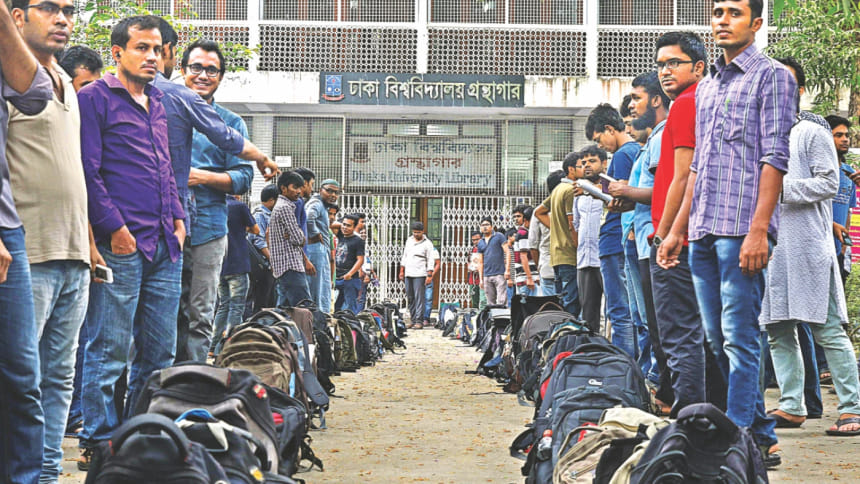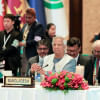Early rush as seats scarce

If you pay a visit to Dhaka University early in the morning, you will find a strange line of bags in front of the central library's entrance.
Bags stuffed with books lie on the ground and they act as a placeholder for students in queue.
As the clock nears 8:00am, students stand close to their bags and get ready to grab a seat inside the library as soon as it opens. Because of a dearth of seats in the library, which can accommodate only 1,100 people, students have discovered this unique way of getting into the library and finding a spot.
“We have to keep our bags in line by 7:00am to get a seat in the library; otherwise we won't get it. Sometimes we stand in queue in front of the library gate, but standing for long is quite difficult,” said Tabibur Rahman Bipu, who recently completed masters' from mass communication and journalism department.
Although the number of DU students has climbed over the years, the university authorities could not expand the library's accommodation accordingly.
In last the 20 years, the number of students rose to 37,064 from 20,863; the number of departments and institutes jumped to 91 from 47 and the number of dormitories increased to 23 from 16. However, the number of seats in the library has increased to 1,100 from 700.
According to library officials, the central library can now seat only 1,100 students while the capacity of science library building is 400. This means one out of 25 current students can get access to these.
Moreover, as there is no checking at the entrance, non students and outsiders can also get into the library to take preparation for exams like Bangladesh Civil Services examinations or for other jobs, deepening the space crisis and depriving the regular students.
“Former students and outsiders often keep seats occupied,” alleged Arifuzzaman, a third-year student of Institute of Education and Research.
Noor Alam, a freshman at the anthropology department, said, “We have to struggle during exam times, as it is hard to get a seat at the central library. I along with my 25 friends live in the 'gono room' [common room of a dorm where freshmen are crammed into] at Shahid Sergeant Johurul Haque Hall where it is almost impossible to study.”
Although there are one or two reading rooms in every residential dormitory of DU, students prefer going to the central library due to the better atmosphere.
Shamsuzzoha Mridha, a student of Arabic studies and a resident of Sir AF Rahman Hall, told this correspondent that they suffer a lot as the dormitory lacks suitable atmosphere for studying and the seats in the reading room are also limited.
“There are not enough lights and fans at the reading room and the library in our dormitory. That's why we want to study in the air-conditioned central library,” said Farhad Uddin, another student of Haji Muhammad Mohsin Hall.
Mohammad Sayed graduated from Pali and Buddhist Studies department recently but visits the library regularly. “I come here with some of my friends to prepare for job tests. We have breakfast and lunch on campus and keep our books on the seats so that others can know that those are occupied. We can study here soundly which is not possible in our mess at Kathalbagan.”
During a visit to the library late last month, this correspondent saw that most of people there were studying books on job exams they had brought with them. Besides, such guide books were kept on the vacant seats so that others could not use them.
Contacted, librarian Prof SM Zabed Ahmed admitted that there was a shortage of seats in the library and said another building was needed to resolve the crisis. “The central library building is a heritage and it cannot be expanded vertically,” he said, adding that 400 seats have been added to the library in the last two years and another 200 new seats will be added this year.
About the access of irregular and former students, he said, “Some DU students come here with their friends of other institutions. Some bring fake IDs. We will introduce digital ID cards by December after which only the regular students will get access.”
DU Vice-Chancellor Prof AAMS Arefin Siddique also acknowledged the accommodation problem.
“It needs a huge amount of money to construct another building and there is also a lack of space to build that. Digitisation process of the library is going on so that students can read books from their dormitory.”
The library that began its journey simultaneously with the Dhaka University in 1921 has 6,74,538 books and magazines. Besides, it has 30,000 rare manuscripts and a large number of booklets, leaflets, pamphlets, and puthis which are preserved in microfilms along with some rare books and documents.

 For all latest news, follow The Daily Star's Google News channel.
For all latest news, follow The Daily Star's Google News channel. 








Comments